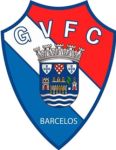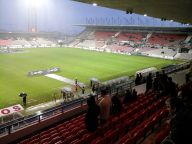Gil Vicente Futebol Clube (Portuguese pronunciation: [ˈʒiɫ viˈsẽt(ɨ)]), commonly known as Gil Vicente, founded in 1924, is a Portuguese football club that plays in Barcelos. It competes in the Primeira Liga, the top division of football in the country, and it is named after the Portuguese playwright of the same name. The best season for the team was in 1999–2000, when it finished fifth in the league.
History
Gil Vicente Futebol Clube was founded on 3 May 1924, after the creation of other clubs in Barcelos, such as Barcelos Sporting Club and Uniao Football Club Barcelense. The idea to found a new club came from a group of friends that every afternoon played football near the city's theater, named Gil Vicente, after the Portuguese playwright. The initial name for the team was Gil Vicente Football Barcelense.
The team first got promoted to the top Portuguese division, then called First Division in 1990. In 1997, it got relegated to the Liga de Honra and came back two years later by winning it. The best position was in the first year back in the Liga, when it finished fifth, led by manager Alvaro Magalhaes, a former Benfica player.
In the 2005–06 Primeira Liga, Gil Vicente fielded an ineligible player being Angolan forward Mateus in the "Mateus Affair". They therefore lost the right to participate in the 2006-07 Primeira Liga, and Belenenses were allowed to stay up. Gil Vicente were accused by the special sports instances that rule Portuguese football of illegally resorting to regular courts on the dispute of Mateus, according to Gil Vicente, illegal contract with his former employer, FC Lixa.
Still convinced this is not a sports-related case but rather work-related, Gil Vicente continued in the courts. Along with the relegation, they were also suspended from the Taca de Portugal for one season.
On 29 May 2011, the club returned to the top flight as champions of the 2010–11 Liga de Honra with a 3–1 home win over C.D. Fatima in front of a club record crowd; mana
This page also has a version in other languages : Жил Висенте (russian)

